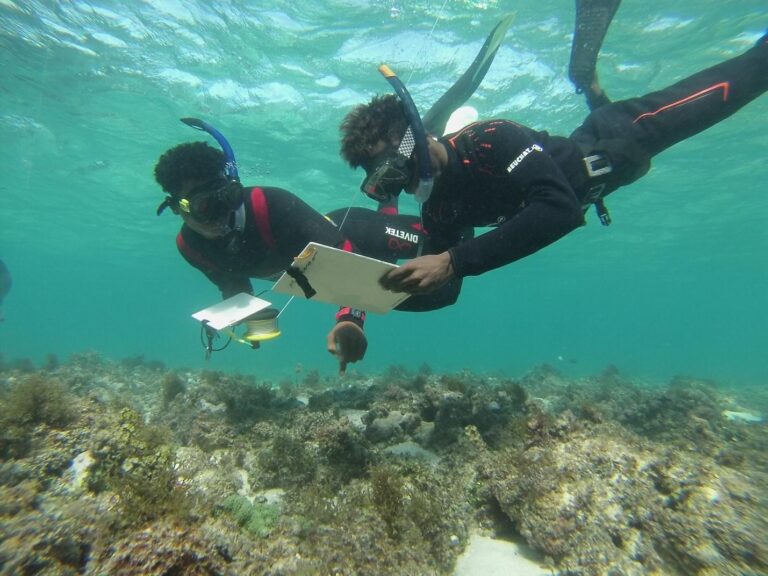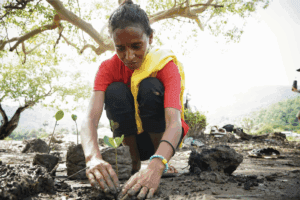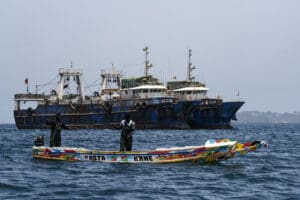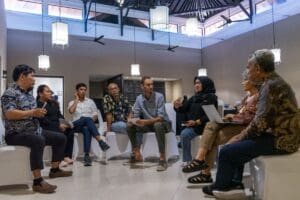Our work is grounded in evidence and underpinned by the most up-to-date data and research. In 2021-2022, several research projects completed in Madagascar delivered new insights into local and global problems, helping us to identify solutions that inform our objectives/strategy, and conservation efforts worldwide.
“These robust reports are a testament to our commitment to the region,” said Dr Jenny Oates, our Knowledge Development Senior Manager.
“We are able to draw out significant findings, because we’ve been working with these communities for a long time,” she added.
That longevity led, in part, to a concerning discovery. Research co-authored by BV’s Charlie Gough, published in the journal Frontiers in Marine Science in 2022, showed that the species caught by small-scale fishers are getting smaller over the years: a phenomenon known as “fishing down the food chain”.
“Charlie’s analysis found that by 2011, the number of fish caught was seven times higher, but they were much smaller,” said Dr Oates.
“Stocks of larger species had been completely depleted. This is the evidence that Blue Ventures needs to help these communities put in place better fishery management – because if this continues, there will be no fish left at all.”
Another threat to food security was identified in a report we co-authored about cyclone Impacts on coral reef communities in southwest Madagascar, published in June 2022. Looking at the long-term impacts of Cyclone Haruna, which struck in 2013, the research gives new insight into how climate-related extreme weather events can destroy and disrupt ecosystems and the livelihoods which depend upon them.
“This is the first study to document the impact of cyclones on coral reefs in Madagascar,” said Dr Oates
“Although there has been regrowth, we discovered that branching corals were particularly badly hit, and are taking longer to recover. This knowledge can help with fishery management, because coral reefs are important habitats for fish.”
Finding what works
Evidence doesn’t just help to pinpoint emerging problems. It can also identify potential solutions. We have always aimed to combine community development with ecosystem conservation. An exciting prospect to do both lies in sea cucumber cultivation. Highly valued as a food source and in traditional East Asian medicine, the sea cucumber is an animal which inhabits seagrass meadows in south-west Madagascar, among other places. But only through careful research, which we co-authored, could communities be sure that this burgeoning local industry was not having harmful unexpected consequences on the marine environment: crucial, if it was to be replicated elsewhere.
“In fact, we discovered that sea cucumber cultivation actually helps with the growth of seagrass,” said Dr Oates.
“The creatures feeding in the meadows stir up the seabed and help fertilise it, and the community has an incentive to protect an ecosystem which sequesters massive amounts of carbon, helping to fight climate change.”
This research – like everything we do – was carried out in close collaboration with the community.
“We have such a close relationship with the communities,” said Dr Oates.
“We train community data collectors, and ensure they’re following protocols, as well as making sure the data which is collected is shared back with communities. We’re known, and trusted. This means the data we get back is accurate, and based on genuine needs. We don’t go in with preconceived ideas, which is fundamental to our values.”
Proof of impact
That trust comes across in one of our favourite pieces of research. In 2022, the journal Ocean and Coastal Management published a paper that we co-authored with researchers from the University of Edinburgh. It was qualitative research to measure the impact of our investment in local aquaculture: but with a difference.
“It used a really engaging methodology called Photovoice,” explained Dr Oates.
“We gave people cameras to take pictures and gather evidence of benefits of being involved in community-based aquaculture themselves. Some of the pictures surprised us – kids in new school uniforms going to school, new furniture at home. It was a way of looking through their eyes, and showing the work is clearly benefiting the communities.”
Alongside the other research from the region, the findings show that local action, when backed up with solid evidence, can have global significance. The Photovoice project reinforced the findings of BV’s 2021 study which showed that fishing communities in southwest Madagascar cited “the benefit to future generations” as the most important motivating factor in conservation projects: a sentiment echoed by millions around the world.









